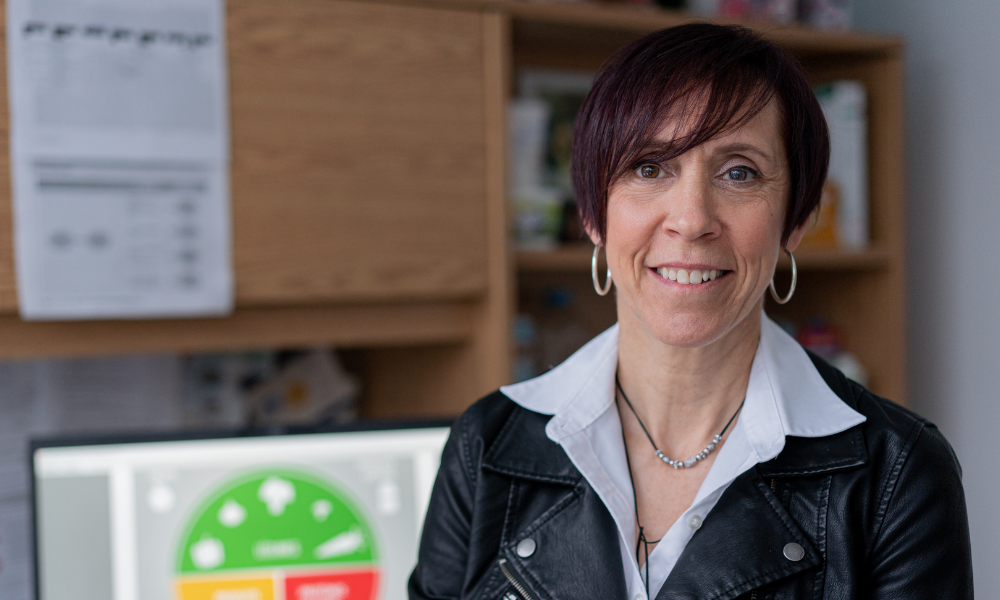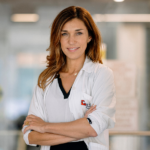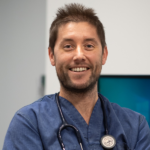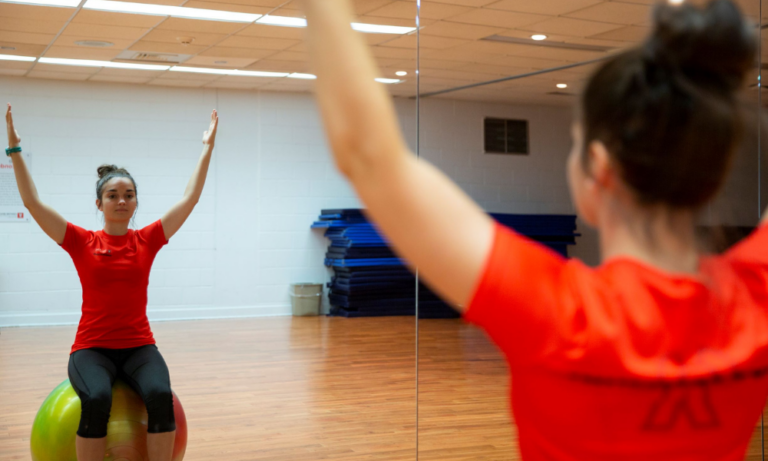The right nutrition: making a big difference in preventing heart disease
Foundation, in collaboration with Élise Latour, nutritionist at the EPIC Centre
Home > Blog > The right nutrition: making a big difference in preventing heart disease
March is Nutrition Month which is the perfect opportunity to discuss how the right diet can be a key tool in the fight against cardiovascular disease. At the Montreal Heart Institute for instance, experts recommend patients adopt a healthy diet such as the Mediterranean diet which can improve their overall health and prevent the recurrence of heart problems.
Élise Latour is a nutritionist at the Montreal Heart Institute’s EPIC Centre who embraced the Institute’s cause more than three decades ago. She shares the ins and outs of her profession and how she helps EPIC Centre members in their quest for a healthy lifestyle.
What is the EPIC Centre?
Founded in 1968, the Montreal Heart Institute’s Centre de médecine préventive et d’activité physique (EPIC Centre) is Canada’s largest cardiovascular prevention centre. Its multidisciplinary team of specialized experts includes cardiologists, kinesiologists, nurses, nutritionists, general practitioners, endocrinologists, researchers, and more. The Centre’s goal is to promote the adoption of healthy lifestyle habits. It is much more than a gym, it is a place that provides members with myriad services covering several aspects of their health.
The EPIC Centre focuses on two pillars
1st pillar: primary prevention
Anyone who wants to remain healthy can become a member of the EPIC Centre and benefit from a preventive assessment. They can undergo a complete checkup to determine their physical condition. This may include a blood test, an exercise stress test, a portrait of their dietary habits, and a consultation with a member of the multidisciplinary team. Nothing is overlooked. Eligible individuals can also benefit from the Sun Life Diabetes Prevention Clinic. A smoking cessation program is also open to members of the EPIC Centre and patients of the Institute who want support in their journey to quit smoking.
2nd pillar: secondary prevention and rehabilitation
Anyone who has experienced a cardiovascular event is said to be in secondary prevention. When they sign up for the EPIC Centre, they will be able to undergo the same preventive assessment as members in primary prevention. Moreover, the Institute’s physicians are available to speak with patients who have recently undergone heart surgeries or who have experienced cardiovascular events in view of their rehabilitation at the Centre. These patients can sign up for a free three-month program at the EPIC Centre focused on nutrition and physical exercise. The Centre’s staff can access the patient’s medical file at any time which makes it easier for them to monitor their condition and progress.
“When it comes to treating cardiovascular disease, nutrition is as important as medication. It’s a cornerstone of prevention,” said Ms. Latour.
A centre focused on innovation
When it was created, the EPIC Centre quickly established itself as a pioneer in the field. At the time, heart surgeries were a novel procedure and the link between food and cardiovascular diseases was still misunderstood. Since then, the medical field has made immense progress thanks in part to several studies carried out at the Centre. In fact, these days nutrition is an important factor in the treatment and prevention of heart disease.
“When I came to the Centre in 1990, I was very impressed by its members who were motivated to avoid a first or second hospitalization at the Institute. Then I had the extraordinary opportunity to work alongside a physician like Dr. Martin Juneau who believes very deeply in the power of nutrition! As a nutritionist, this was immensely gratifying because this kind of belief was rare at the time. I’ve even worked with a few cardiologists who outright denied that nutrition could have an impact on heart disease. Thankfully, things have changed and Dr. Juneau has always been an ally.”
Taking care of members’ overall health
The EPIC Centre’s mission is to prevent cardiovascular diseases. To treat and prevent these problems, the team focuses on improving members’ overall health. Using nutrition to prevent and treat heart disease also has a positive impact on other conditions such as diabetes, blood pressure, weight problems, cancer, and cognitive decline. Because many factors are intertwined, the Centre favours a broader approach to health.
A balanced diet: the ultimate goal
A balanced diet provides all the vitamins, minerals, and nutrients a person needs. Élise Latour relies on 5 aspects to evaluate the quality of a person’s diet and promote healthy habits. They are:
1. A balanced diet, or a Mediterranean-style diet
A balanced diet is the foundation for the four other aspects and has a direct impact on a person’s overall health.
2. Fats
Which fats should we be eating? Some are beneficial (olive oil, avocadoes, nuts, and fatty fish), some should be eaten in moderation (animal fat, palm oil), and others should be avoided (ultra-processed fats, fried foods). You should learn to identify which is which.
3. Sugars
Just like with fats, there are several types of sugars (carbohydrates). “Some carbs are good for your health, like fruit and whole wheat flour, and some are not so good, like fast-acting carbs (sugar, brown sugar, soda, desserts, etc.).”
4. Fibres
Fibres are our ally. They have a positive effect on blood pressure, reduce the levels of bad cholesterol, help control blood sugar levels, help prevent cancers, regulate bowel movements, and help control appetite. They can be found in fruits, vegetables, nuts, legumes, and whole grain products.
5. Salt
These days, people are eating more and more processed foods and ready-made meals that include a high amount of salt. It’s important to help people understand how to read nutrition facts labels on the products they purchase.
The day-to-day life of a nutritionist at the EPIC Centre
How does this nutritionist support the members and patients who consult her? Generally, she offers guidance during private consultations where she evaluates the patient. She also designs a personalized diet plan, provides advice and easy-to-understand learning tools, offers practical solutions as well as encouragement and support to help them change their dietary habits. But first and foremost, she strives to work as a team with the patient. “Support, guide, encourage. That’s what my job entails.”
“As part of the cardiac rehabilitation clinic, she also participates in two group meetings that focus on nutrition. People get together (when there is no pandemic) with others who have gone through the same experience. They can benefit from the advice of others and share their own tips. That’s a really valuable tool.”
The EPIC Centre also offers cooking workshops. Lasting 2 ½ hours, these workshops are led by the Centre’s nutritionists and feature Mediterranean cuisine. Their goal is to provide inspiration to people and help them cook simple, delicious meals. During the classes, members pair up to cook recipes, taste their creations, and discuss nutritional information. “I tell them how foods can benefit their health. Yes, it’s about eating more fruits and vegetables, but what does that mean in reality? When we understand why we recommend one food over another, it’s easier to integrate it into our diet. It becomes more tangible. I always try to find examples related to the problem that is the reason the person is consulting me. It’s a more direct way to reach them.”
Quick results
The rehabilitation clinic program lasts three months and that’s enough for patients to begin seeing a positive change in their physical condition. “We can see changes in their blood sample. By focusing on the right nutrition and exercise, people tell us they feel better, that they have more energy and sleep better. They quickly experience a change and reap the benefits.”
The impacts of the pandemic on nutrition
The pandemic has changed our lives in a major way but what impact has it had on members? “It’s harder. We’re managing a bit better now, but the first wave really upended the lives of both the patients and staff. Everyone had to adapt.” During the first wave, several members of the Sun Life Diabetes Prevention and Treatment Clinic fell back on old habits. They were eating more and not always the right foods. They didn’t know how to train without the structure of the Centre. “We’ve been able to adapt to these exceptional times and now we’re back to making progress!”
There has been a silver lining to the pandemic: people have more time to cook and don’t go out to eat as much. “I tell them to take advantage of this time to try new foods. Try to make one new recipe every week and if you find something you like, tell me. We’ll share it with others!”
This month’s theme: good and good for you!
What advice does our nutritionist have for Nutrition Month? “Continue to make time to cook. Be bold, by curious, try new local products. Nothing is as good as a home-cooked meal.”
Want to contribute to research and the prevention of cardiovascular diseases?
donate today









